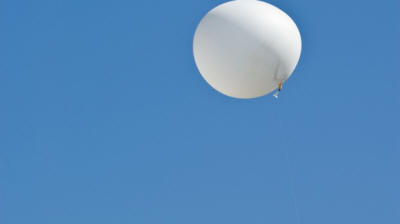|

by Martin Lukacs
The Guardian
July 17, 2012
from
RawStory Website

Two Harvard engineers are planning to
spray thousands of tonnes of sun-reflecting chemical particles into
the atmosphere to artificially cool the planet, using a balloon
flying 80,000 feet over Fort Sumner, New Mexico.
The field experiment in solar
geoengineering aims to ultimately
create a technology to replicate the observed effects of volcanoes
that spew sulphates into the stratosphere, using sulphate aerosols
to bounce sunlight back to space and decrease the temperature of the
Earth.
David Keith, one of the
investigators, has argued that solar geoengineering could be an
inexpensive method to slow down global warming, but other scientists
warn that it could have unpredictable, disastrous consequences for
the Earth’s weather systems and food supplies.
Environmental groups fear that the push
to make geoengineering a “plan B” for climate change will undermine
efforts to reduce carbon emissions.
Keith, who manages a multimillion dollar
geoengineering research fund provided by
Microsoft founder Bill Gates,
previously commissioned
a study by a U.S. aerospace company
that made the case for the feasibility of large-scale deployment of
solar geoengineering technologies.
His U.S. experiment, conducted with American James Anderson,
will take place within a year and involve the release of tens or
hundreds of kilograms of particles to measure the impacts on ozone
chemistry, and to test ways to make sulphate aerosols the
appropriate size.
Since it is impossible to simulate the
complexity of the stratosphere in a laboratory, Keith says the
experiment will provide an opportunity to improve models of how the
ozone layer could be altered by much larger-scale sulphate spraying.
“The objective is not to alter the
climate, but simply to probe the processes at a micro scale,”
said Keith. “The direct risk is very small.”
While the experiment may not harm the
climate, environmental groups say that the global environmental
risks of solar geoengineering have been amply identified through
modeling and the study of the impacts of sulphuric dust emitted by
volcanoes.
“Impacts include the potential for
further damage to the ozone layer, and disruption of rainfall,
particularly in tropical and subtropical regions - potentially
threatening the food supplies of billions of people,” said Pat
Mooney, executive director of the Canadian-based technology
watchdog ETC Group.
“It will do nothing to decrease
levels of greenhouse gases in the atmosphere or halt ocean
acidification. And solar geoengineering is likely to increase
the risk of climate-related international conflict - given that
the modeling to date shows it poses greater risks to the global
south.”
A scientific study published last month
(Solar
Irradiance Reduction to Counteract Radiative Forcing from A
Quadrupling of CO2)
concluded that solar radiation management could decrease rainfall by
15% in areas of North America and northern Eurasia and by more than
20% in central South America.
Last autumn, a British field test of a balloon-and-hosepipe device
that would have pumped water into the sky generated controversy.
The government-funded project -
Stratospheric Particle Injection for Climate Engineering (Spice)
-
was cancelled after a row over
patents and a public outcry by global NGOs, some of whom argued the
project was a “Trojan horse” that would open the door to full-scale
deployment of the technology.
Keith said he opposed Spice from the outset because it would not
have improved knowledge of the risks or effectiveness of solar
geoengineering, unlike his own experiment.
“I salute the British government for
getting out and trying something,” he said.
“But I wish they’d had a better
process, because those opposed to any such experiments will see
it as a victory and try to stop other experiments as well.”
The Guardian understands that Keith is
planning to use
the Gates-backed fund to organize a
meeting to study the lessons of Spice.
|

